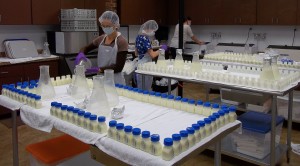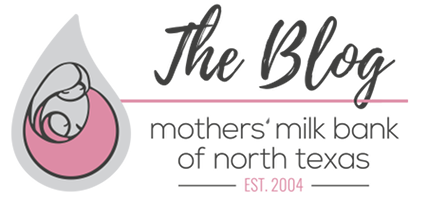If you have ever considered selling
your surplus breastmilk,
here’s why you should
donate to a non-profit milk bank instead.
By Amy Vickers, MSN, RN, IBCLC, Executive Director, Mothers’ Milk Bank of North Texas
There are many reasons it is both important and ethical to donate your milk to a non-profit milk bank:
Human milk is a precious, limited resource and should be prioritized for the sickest of babies with the greatest need. For premature babies born under 3 pounds, donor milk is life saving. Some babies go home from the NICU still receiving donor milk. These babies are particularly fragile. For example, many recipient babies have severe birth defects, cancer, kidney or liver failure, or immunological syndromes. Some are awaiting a heart transplant, other types of open-heart surgeries, post bone marrow transplants and other procedures.
A small amount of donor human milk can nourish a large number of premature and critically ill babies. Normally, a healthy ten-pound baby requires 30 to 40 ounces of milk per day. For premature infants, the same amount of milk may feed 30 micro preemies for 24 hours. Milk donated to a non-profit milk bank goes a long way.
Selling or buying human donor milk opens up several quality control concerns. Would a needy mom deprive her baby of milk or dilute her milk because she needed the money by selling it? Could selling milk create a system in which only those that can pay for it receive it? The blood banking industry has found that donors who donate simply to help another person and not receive anything in return, yield the best results. Additionally, helping another mom’s baby is the main motivation we hear from our donors.
Non-profit milk banks do not charge recipients for the milk itself. There is a lot of misinformation on donating to non-profit milk banks. Families are not charged for the milk, only for the expenses of milk processing. Tissue processing fees include the costly procedures of storing, pasteurizing, testing and dispensing donor milk. Careful processing is vitally important because it ensures milk safety. These fees only cover 60% of milk bank’s operational costs. Remaining funds are raised through fundraising events, individual donations, grants and community support. For babies who have been discharged, our charitable care program provides milk for medically needy babies without the means to pay processing fees.
Non-profit milk banks operate under the guidelines of respected, authoritative national organizations. Non-profit milk banks such as Mothers’ Milk Bank of North Texas adhere to the strict scientific safety guidelines of the Human Milk Banking Association of North America (HMBANA). In addition, the milk bank follows the U.S. Food and Drug Administration’s (FDA) regulations related to the processing, handling and storage of food.
 Screening donors and processing the milk ensures safety. Donors are screened for risk factors in a similar way to blood donors. They complete a rigorous screening process that includes blood testing for communicable diseases such as AIDS. Gentle pasteurization preserves immunological properties but destroys harmful bacteria that can be present from collection, storage or infection. Such bacteria are usually not harmful to a mother’s own baby, but could potentially be harmful to a medically compromised baby. The milk is tested for these bacteria as well as for nutritional components.
Screening donors and processing the milk ensures safety. Donors are screened for risk factors in a similar way to blood donors. They complete a rigorous screening process that includes blood testing for communicable diseases such as AIDS. Gentle pasteurization preserves immunological properties but destroys harmful bacteria that can be present from collection, storage or infection. Such bacteria are usually not harmful to a mother’s own baby, but could potentially be harmful to a medically compromised baby. The milk is tested for these bacteria as well as for nutritional components.
Non-profit milk banks provide charitable care. A fragile baby going home from the hospital on donor milk will receive it, regardless of the family’s ability to pay processing fees. In 2013 alone, Mothers’ Milk Bank of North Texas provided $615,000 of donor human milk to fragile babies at home with families that had no means of paying processing fees. Babies are prioritized based on their medical condition, NOT their ability to pay.
 Alejandra Andrade's cutie shows off their pumped breastmilk
Alejandra Andrade's cutie shows off their pumped breastmilk
While EVERY baby can benefit from human milk, it is important to appropriate donor milk where it can do the most good for the most babies. At Mothers’ Milk Bank of North Texas, we are so very grateful to the donor mothers willing to share their milk with these precious babies that have so much to lose without it.
For more information about Mothers’ Milk Bank of North Texas or about becoming a donor, please call 817.810.0071 or visit our website.

